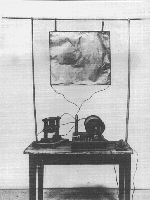

Involvement in amateur radio allows people to practice their public speaking skills as well as the advancement of one's knowledge of radio theory, electronics, and emergency management. Amateur Radio was started by the very founders of radio. Marconi, and other amateur scientists, took theory and made it real, creating the first radio transmitters and receivers. Amateurs continue to innovate. Amateurs have even been deployed by the military during the great world wars, due to the Amateur skill and knowledge. The United States would not have had the success without the Amateur Radio operators, innovations and skills.
 Ham Radio started with Marconi
(see also this
Marconi Site) -- he did not want to accept popular science's thinking that
radio waves were limited to line-of-sight and limited in range. Debate raged
over the common theories.
Marconi decided to test all of this out, and created his first radio transmitter, and
put the receiver out in the far end of his garden. He placed obstacles in the
path, and then had his assistant transmit. He heard it, and we now have cell
phones, television, and all of the other telecommunications using radio, because
of his amateur radio experiment. Ham Radio continues to test ideas and forge new
ground in practical communications.
Ham Radio started with Marconi
(see also this
Marconi Site) -- he did not want to accept popular science's thinking that
radio waves were limited to line-of-sight and limited in range. Debate raged
over the common theories.
Marconi decided to test all of this out, and created his first radio transmitter, and
put the receiver out in the far end of his garden. He placed obstacles in the
path, and then had his assistant transmit. He heard it, and we now have cell
phones, television, and all of the other telecommunications using radio, because
of his amateur radio experiment. Ham Radio continues to test ideas and forge new
ground in practical communications.
The hobby can be as simple as talking on local-area repeaters with those in the
same town, to building a satellite or experimenting with new forms of
telecommunications. The HAM hobbyist can talk to those on the other side of the
earth with nothing more than a simple High Frequency transceiver and an equally
simple wire antenna.
Amateur radio is used in search-and-rescue, contests, disaster aid (hurricanes,
earthquakes, tornadoes, floods, accidents, fires), and much more. Amateur radio
operators talk with other HAM radio hobbyists using all sorts of communication
modes. From Morse Code and voice to Slow Scan Television and computer networking
through the radio waves, these hobbyists reach out with goodwill from their
homes, cars, boats and outdoors. Some also like to work on electronic circuits,
building their own radios and antennas. Dedicated hobbyists have pioneered in
new technology, contributing to advances in technology that has impacted the
world of communications in all areas of our lives. Even ham-astronauts take
radios with them on space shuttle missions, and make calls to earth-bound
Amateurs.
Getting started in Amateur Radio has never been easier. If you are in the United
States, one way to start is to locate
a radio club in your area. Some radio clubs offer ham radio licensing
classes, or they can find a club volunteer to answer your questions. You may
even be invited to attend a local radio club meeting. You will also want to check
out the ARRL website.
If you are interested in this hobby, pick up Now
You're Talking! All You Need to Get Your First Ham Radio License - it is a
great way to start!
The Amateur's Code
The Radio Amateur is CONSIDERATE...never knowingly operates in such a way as to
lessen the pleasure of others.
LOYAL...offers loyalty, encouragement and support to other amateurs, local
clubs, and the American Radio Relay League, through which Amateur Radio in the
United States is represented nationally and internationally.
PROGRESSIVE...with knowledge abreast of science, a well-built and efficient
station and operation above reproach.
FRIENDLY...slow and patient operating when requested; friendly advice and
counsel to the beginner; kindly assistance, cooperation and consideration
for the interests of others. These are the hallmarks of the amateur spirit.
BALANCED...radio is an avocation, never interfering with duties owed to
family, job, school or community.
PATRIOTIC...station and skill always ready for service to country and
community.
--The original Amateur's Code was written
by Paul M. Segal, W9EEA, in 1928.